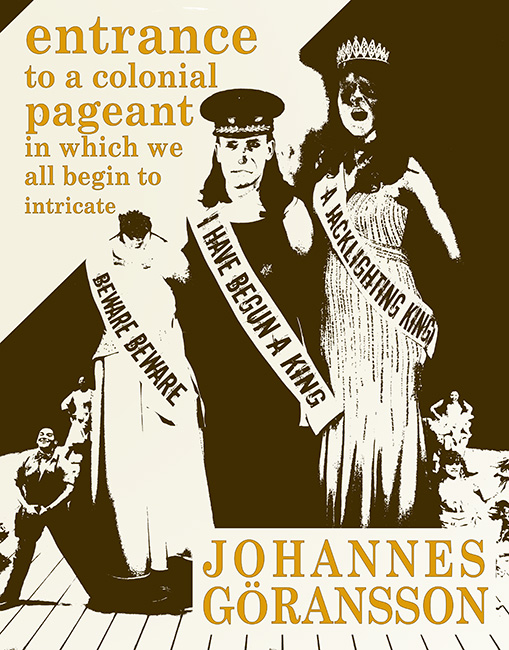Oscar Recap: Something Good Won
One of the winners at last night’s Oscars was a short animated film by a guy named Shaun Tan. The film is called The Lost Thing. And it was far and away the best of the nominated shorts. (The Pixar thing was fine. The pollution thing was fine. The Gruffalo was kind of terrible. The Madagascar piece looked nice but was sort of empty.) But, deserved to win, did win. Who knew?
Here I admit a bit of a bias: I really like Shaun Tan. So I was bound to favor his piece over any of the others. And I really like Shaun Tan because I really, really like his bookThe Red Tree. READ MORE >
COIN
The editors of Copper Nickel, the literary journal at the University of Colorado Denver, have launched Coin, a companion website which mines (forgive me) some of the better work from the literary journal, and presents it alongside ancillary materials (interviews, conversations, essays about the making of stories, etc.) The inaugural issue includes poems from Dan Albergotti, Sandy Florian, Ed Pavlic, and Ginny Hoyle, Snezana Zabic’s essay “Meet Satan,” and, most interestingly, a portfolio of work by and about Michael Copperman, whose story “It” is written, as he describes it, in “black Delta dialect, not reproducing African-American Vernacular English (AAVE) so much as depicting a particular boy speaking it,” although the story’s author self-describes as “a Japanese-Hawaiian Russo-Polish Jew” in his essay “Race, Authenticity, Culpability,” which appears alongside the story.
Notes on Johannes Göransson’s Pageant

I first read Johannes Göransson’s Entrance to a colonial pageant in which we all begin to intricate (Tarpaulin Sky, 2011), on a rickety train moving westward from South Bend, Indiana, to Chicago during the recent blizzard. The ride, which usually takes 2.5 hours or so, stretched into a nearly 4 hour-long, thunder-snow tour of rust belt America. This is not a review. This is a context.
As we chugged through locales such as Michigan City, Indiana, and Gary, I set my reading of this book on repeat. The book, itself a hybrid form somewhere between or among the categories of poetry, prose, essay, theatre production, and instruction manual, is also an exercise in engaging with the fluidity of self. Riding the train in such conditions, one identifies with the character of THE PASSENGER who states, acts, or otherwise embodies the following words in its opening salvo:
I was admitted. I had to answer questions. Are you gay? Are
you a terrorist? Are you a communist? I answered No to all the
questions. After a while I started noticing that the questions had
changed. What do insects have to do with cinema? Can you hear
me? Are we underwater? Can I kick you in the face? Why do
your spasms look infantile? Do you know how to break a radio?
But I kept answering No. Because that’s what I wanted to hear
myself say with that bag over my face
and also is embodied by THE NATIVES who “ask these questions of the most beautiful people they can find in a mall”:
February 28th, 2011 / 7:21 pm
Your best guess: what percentage of HTMLGIANT do you watch? No one cares.
O Hai some librarians are boycotting HarperCollins because they want to limit how many times an ebook can be ‘checked out.’
What is Experimental Literature? {Special Announcement}

Starting tomorrow, I will begin a month-long series I’ve blandly entitled “Five Questions About Experimental Literature,” which will showcase responses from ten contemporary innovators in the field: Bhanu Kapil, Miranda Mellis, Debra Di Blasi, Tantra Bensko, Susan Steinberg, Kate Zambreno, Amelia Gray, Danielle Dutton, Alexandra Chasin, and Lidia Yuknavitch.
The goal is to continue the exploration of this topic by opening the conversation to other perspectives.
I’m super excited to share with you the amazing responses the writers have given. The range is staggering. The insights are enlightening. I can’t thank the writers enough for all of the time and energy they’ve offered to this project, which promises to be very rewarding.
I hope you’ll enjoy this month’s series. If all goes well and it seems like people are into it, I plan to continue the series by creating five new questions for the month of April and inviting ten new writers to participate.
The Ben Greenmans
 Ben Greenman’s book What He’s Poised to Do is worth your time. I’m not sure which Ben Greenman wrote it, since there seem to be around 43 Ben Greenmans sharing similar biographical notes. One of them wrote Celebrity Chekhov, in which Chekhov characters are replaced by the likes of Lindsay Lohan, Britney Spears, Alec Baldwin, Kim Kardashian, Oprah, and so on. That Ben Greenman also runs the Celebrities with Character blog, where you can write letters to actual celebrities. Both of these Ben Greenmans READ MORE >
Ben Greenman’s book What He’s Poised to Do is worth your time. I’m not sure which Ben Greenman wrote it, since there seem to be around 43 Ben Greenmans sharing similar biographical notes. One of them wrote Celebrity Chekhov, in which Chekhov characters are replaced by the likes of Lindsay Lohan, Britney Spears, Alec Baldwin, Kim Kardashian, Oprah, and so on. That Ben Greenman also runs the Celebrities with Character blog, where you can write letters to actual celebrities. Both of these Ben Greenmans READ MORE >
Internet Depersonalization Goes Both Ways
![]() It has taken me a long time to write this, even though I’ve known the whole time what I wanted to say. But there is a story, and there is the reason I want to tell the story, and it is hard to figure out how to make the second one, the reason, count more, both for me and for whoever reads this.
It has taken me a long time to write this, even though I’ve known the whole time what I wanted to say. But there is a story, and there is the reason I want to tell the story, and it is hard to figure out how to make the second one, the reason, count more, both for me and for whoever reads this.
Also, the story involves someone whom people know. Someone I’ve met once, but who I have something like 75  facebook friends in common with. By comparison, my best friend of 25 years and I share only 53 mutual friends. So, there’s this question of whether to say who the someone is. This goes back to the earlier point–it isn’t important who, in terms of why I want to tell this story. I’m not telling this story to call someone out. So, don’t say who it is, right? But then what if people think it is someone who it isn’t, and have resulting feelings about the wrong person? Maybe I should turn comments off? But I don’t want to turn comments off. Not yet. I would like there to be a discussion about what I’m trying to say, but not about who I am talking about. So, please, don’t try to guess; if you do I’ll flag the comment for Blake to delete.
facebook friends in common with. By comparison, my best friend of 25 years and I share only 53 mutual friends. So, there’s this question of whether to say who the someone is. This goes back to the earlier point–it isn’t important who, in terms of why I want to tell this story. I’m not telling this story to call someone out. So, don’t say who it is, right? But then what if people think it is someone who it isn’t, and have resulting feelings about the wrong person? Maybe I should turn comments off? But I don’t want to turn comments off. Not yet. I would like there to be a discussion about what I’m trying to say, but not about who I am talking about. So, please, don’t try to guess; if you do I’ll flag the comment for Blake to delete.
So. Mean Week 2009 was less than a week into when I started writing for HTMLGiant. I hadn’t read it super regularly, and I wasn’t sure what Mean Week was supposed to be, and I did it really wrong and felt really bad feelings. The worst feeling I had came from a horrible, virulently misogynist, hateful, anonymous comment in the form of a beyond-degrading epithet directed toward me. Anonymous meaning the person identified himself by his first name but there was no link attached or anything indicating who the person really was. (See why I am reluctant even NOT to say who it is? By this unspecific description, you might think you know who it is. Like, Jereme Dean uses his first name with no link, and if you didn’t know that I’ve never met Jereme even once, you could think it is him. But it is not. To my knowledge Jereme is not hateful even if he disagrees with people a lot.)
wasn’t sure what Mean Week was supposed to be, and I did it really wrong and felt really bad feelings. The worst feeling I had came from a horrible, virulently misogynist, hateful, anonymous comment in the form of a beyond-degrading epithet directed toward me. Anonymous meaning the person identified himself by his first name but there was no link attached or anything indicating who the person really was. (See why I am reluctant even NOT to say who it is? By this unspecific description, you might think you know who it is. Like, Jereme Dean uses his first name with no link, and if you didn’t know that I’ve never met Jereme even once, you could think it is him. But it is not. To my knowledge Jereme is not hateful even if he disagrees with people a lot.)
 Whatever Mean Week is, this comment was beyond. It isn’t called Hate Week.
Whatever Mean Week is, this comment was beyond. It isn’t called Hate Week.
Again, this was early in my tenure here. I didn’t know the game. I don’t have a thick skin. I’ve always been called sensitive, as if it is a bad thing, and certainly there is this idea that I shouldn’t let things like this get to me, not on the internet, not on HTMLG, certainly not on Mean Week. I disagree. Sure, it may have negative effects on me, but I think it is dangerous to disregard hatefulness. This is why I am telling the story.
Of course, though it affected me and made me cry, I had to somehow get past it, and the way I did this (I thought) was to reason that the person didn’t know me, and didn’t really think of me as a person. Like, in response to another nasty comment directed toward me by someone else, Blake commented (for which I thank him), “would you say this to her face?” This made me feel better about both commenters. They just see my name and don’t really think about that name being attached to a real person with real feelings. They couldn’t.
that the person didn’t know me, and didn’t really think of me as a person. Like, in response to another nasty comment directed toward me by someone else, Blake commented (for which I thank him), “would you say this to her face?” This made me feel better about both commenters. They just see my name and don’t really think about that name being attached to a real person with real feelings. They couldn’t.
I still think that’s true. But here’s the twist: Six months later, I met the person who made the hate comment, and, apologetically, he identified himself as the commenter, and said it wasn’t really about me, or something, and he was sorry.
James Pate at Montevidayo says some really precise stuff about chaos and art, ending with this (YES): “With both–and with Grosz too, I would say– we’re left with an aesthetic that I like to think of as the abandoned house approach to art. You go in and wander around, but no one lives there anymore.”
Western speech is like badgers & birds: free.
The west has fiscalised its basic power relationships through a web of contracts, loans, shareholdings, bank holdings and so on. In such an environment it is easy for speech to be “free” because a change in political will rarely leads to any change in these basic instruments. Western speech, as something that rarely has any effect on power, is, like badgers and birds, free. In states like China, there is pervasive censorship, because speech still has power and power is scared of it. We should always look at censorship as an economic signal that reveals the potential power of speech in that jurisdiction. The attacks against us by the US point to a great hope, speech powerful enough to break the fiscal blockade. — Julian Assange



